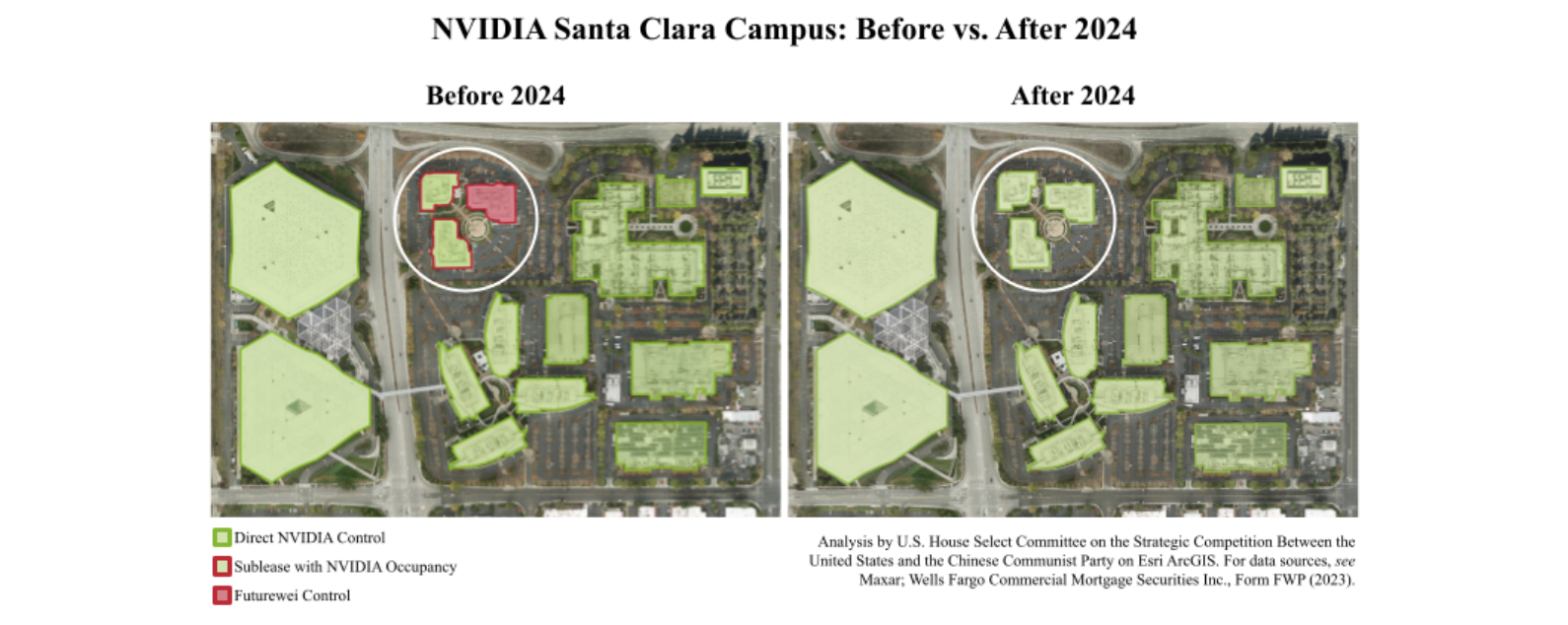Chinese tech company Huawei’s American subsidiary, Futurewei, has quietly infiltrated key international regulatory bodies in an attempt to bring the Chinese Communist Party’s “vision for authoritarian internet control” mainstream and potentially “extract sensitive data” from leading U.S. firms like NVIDIA, according to a bipartisan investigation by the House Select Committee on China.
Reps. John Moolenaar (R., Mich.) and Raja Krishnamoorthi (D., Ill.), the CCP committee’s chair and ranking member, informed Futurewei vice president Jason Chao on Sunday that their investigatory body is probing the company over “its relationship with Huawei Technologies Co., Ltd. (Huawei), and its role in advancing Chinese Communist Party technology objectives,” a copy of the letter obtained by the Washington Free Beacon shows.
While the U.S. government has partially banned Huawei and subjects the company to strict federal oversight, Huawei’s American affiliate continues to operate much more openly. It has used this freedom to place “Huawei-linked personnel in leadership roles” at influential internet policy and regulatory bodies, primarily “to promote proposals that would reshape global internet architecture,” according to Moolenaar and Krishnamoorthi. The company has also lobbied heavily to promote Huawei’s CCP-controlled mobile operating system, HarmonyOS, seeking to offset the dominance of Android and Apple.
“These activities,” the House China Committee leaders wrote, “threaten American national security and democratic values by positioning the CCP to displace U.S. leadership and control the internet protocols, operating systems, and foundational technologies that underpin critical infrastructure and worldwide telecommunications networks.”
Futurewei’s influence operations are not limited to attempting to spread CCP technology throughout the United States. The company has also forged a “decade-long strategic positioning within NVIDIA’s Santa Clara headquarters campus,” according to an analysis by House investigators. NVIDIA subleased three buildings from Futurewei until 2024, the committee found, giving the Chinese-linked firm “unprecedented access to America’s most advanced semiconductor and AI capabilities.”

This arrangement had the potential to enable Futurewei to engage in “enterprise espionage,” as alleged in a 2018 civil complaint that detailed how Huawei uses its American subsidiary “to circumvent restrictions when legitimate access is denied.”
Facebook, for instance, barred Huawei from a closed-door telecommunications summit over security concerns. Huawei allegedly directed Futurewei employees to “register using fake U.S. company names,” “infiltrate into the meeting,” and compile reports to transfer “to product development, strategies teams and executives in China,” according to the complaint.
Those allegations raise troubling questions about Futurewei’s long-term arrangement with NVIDIA, according to CCP committee leadership.
“If Futurewei was used to infiltrate closed-door industry meetings and extract sensitive data through both deception and proximity, then its decade-long embedded presence within NVIDIA’s campus—at the center of U.S. semiconductor and AI development—cannot be immediately dismissed as incidental,” Moolenaar and Krishnamoorthi wrote. “This proximity potentially afforded it daily exposure to proprietary technologies and strategic planning within one of America’s most critical innovation hubs.”
Futurewei recently relocated to a separate address in San Jose, located about 10 minutes from NVIDIA’s headquarters. The company’s “continued presence in the heart of Silicon Valley underscores unresolved concerns about how it may still be operating,” the China committee chairs wrote.
The congressional investigation goes on to detail how Futurewei employees quietly replaced their Huawei counterparts on influential internet policy and regulatory bodies amid expanding American pressure in 2019.
Futurewei, the lawmakers allege, “aggressively expanded its footprint in policy and industry circles, positioning itself as a proxy to promote and normalize its authoritarian technology and standards in a bid to reshape global tech narratives.”
In 2020, for example, Huawei abandoned its membership in the Internet Society, a well-known industry advocacy organization. Futurewei joined shortly thereafter and immediately began advocating for stricter regulatory policies favored by Beijing. By 2022, Futurewei “secured a seat on the Society’s board of trustees and elevated its status to Platinum-level membership,” according to the letter.
The U.S. government has already taken some action against both Huawei and Futurewei. The Department of Justice charged the two companies in 2020 with racketeering, conspiracy to steal trade secrets from six American companies, and “repeatedly making material misrepresentations” about its work in countries like Iran. The legal action led the Air Force to suspend its contract work with Futurewei.
Moolenaar and Krishnamoorthi say more needs to be done. The first step they have taken is pressing Futurewei’s leaders to turn over a litany of internal documents that detail its relationship with Huawei and the firms’ shared corporate architecture. The two committee leaders also want “copies of all board meeting minutes,” “a detailed breakdown of Futurewei’s revenues,” and information related to any ongoing agreements Futurewei has with U.S.-based technology companies.
“This continued expansion of influence—particularly through standard-setting organizations and open-source ecosystems—requires transparency regarding Futurewei’s operations, financial backing, and true affiliations,” the lawmakers wrote, adding that Congress has “consider[ed] potential legislation in this space.”
Hudson Institute senior fellow Michael Sobolik, who specializes in U.S.-China competition, told the Free Beacon that the committee’s letter presents further evidence of CCP-controlled firms attempting to infiltrate the American tech industry.
“The early results of the Select Committee’s bipartisan investigation into Futurewei are troubling: Huawei appears to be using its U.S. subsidiary to advance its technical dominance in America and around the world in standards-setting bodies,” Sobolik said. “Especially concerning is Futurewei’s former presence on Nvidia’s Santa Clara campus. The committee is right to investigate the possibility of advanced semiconductor tech transfer.”
Chinese tech has been in the news lately as the Trump administration works to come to a deal on TikTok, currently owned by CCP-controlled company ByteDance. Treasury Secretary Scott Bessent on Monday told reporters that the U.S. and Chinese governments had reached a framework for an agreement and that President Donald Trump and Chinese president Xi Jinping will speak on Friday to potentially finalize the deal, which would have the CCP sell U.S. ownership of the app to an American buyer.
















